The diamond reamer is a high-precision bore machining tool developed in the past 20 years. Due to its high processing accuracy (generally up to 2μm), low surface roughness (generally up to Ra 0.4 to 0.2μm), high processing efficiency (generally 3 to 5 times) and long life (generally capable of processing 10,000) More than one piece), the quality is stable and reliable, so it has been widely used in hydraulic, agricultural machinery, automotive, machine tools, military and other industries. To date, inclusive plating technology has been successfully applied to the manufacture of high precision diamond rollers, but has not been used to manufacture diamond reamer. The method of plating in the diamond reamer is to use a stable material to manufacture a high-precision inner hole tire mold which is opposite to the shape of the reamer, and to plate the diamond abrasive grains on the inner surface of the tire mold, thicken to form a plating layer, and then the plating layer and the arbor Bonded together. In order to smoothly remove the film, a low-melting metal can be firstly plated on the inner surface of the film, and finally heated and demolded to form a reamer. At the same time, it can also ensure that the high-precision inner hole tire mold can be reused without being damaged, so as to reduce the manufacturing cost. For a normally used diamond reamer, the abrasive particles should be exposed to participate in the cutting. Therefore, the bonding agent between the abrasive grains should form a pit. During the reaming process, a large amount of chips are hidden in these pits (Fig. 2), and part of the binder is etched away, so that the pits in front of the abrasive grains are gradually deepened; the binder behind the abrasive grains is rarely chipped. Corrosion, at the same time due to the action of the pressing force, the binder is moved backwards, which further strengthens the supporting effect on the abrasive grains. This is one of the reasons why the particles of the diamond reamer are not easily detached and the reamer remains long (Fig. 3). At present, diamond reamer has two types of fixed and adjustable. In order to machine high-precision bores, the diamond reamer should be fixed. Because the fixed reamer is simple in manufacturing process, easy to grind, low in cost, and dimensional stability of the machined hole. A schematic diagram of the structure of a fixed diamond reamer for machining through holes is shown in FIG. The structural design of the main part of the reamer is discussed in detail below. Since the dimensional accuracy and shape accuracy of the inner containment reamer are mainly guaranteed by the accuracy of the tire mold, the design and manufacture of the tire mold is essential. The inner hole of the tire mold should be designed to be opposite to the shape of the reamer and finely ground on a high-precision grinding machine. In order to make the plating layer uniform in size and fast in deposition speed, the flow plating process is poor for the internal plating method, and the flow rate of the plating solution is about 5 to 30 m/min. After trial and error, we finally got a series of standardized and standardized inclusive precision diamond reamer. Through the processing and testing of typical materials and typical parts, as well as the comparison of the technical parameters and cutting performance of the reamer manufactured by the external plating method, the following conclusions can be drawn:
solar street light
solar flood light
highbay light
grow light
Rechargeable Flood Light,Outdoor Solar Flood Light,Portable Led Solar Flood Light,Rechargeable Solar Flood Light zhongshanshi huadengxing lighting co., ltd , https://www.ledhdx.com 1 Introduction
The electroplated diamond reamer is formed by encapsulating the diamond particles on the cutter body by means of electroplating using metal nickel, iron or copper as a bonding agent. The electroplated reamer requires a high geometric accuracy on the surface of the electroplated layer to ensure that the abrasive cutting edge has good contour and sharpness, reduces the cutting load, and improves the geometric quality, physical quality and durability of the reamer.
At present, the domestic diamond reamer is manufactured by external plating. At the time of manufacture, the abrasive grains need to be strictly screened, and the abrasive grains are directly fixed around the cutter body by the plating metal. The reamer of the plated reamer has poor contour and needs to be ground with a diamond wheel, but the grinding will destroy the natural edge of the abrasive grain and passivate the abrasive grain, which affects the processing efficiency and the surface quality of the hole to be processed. To this end, we have proposed a new design and manufacturing method - the internal inclusion plating method (referred to as the internal plating method), and the reamer design, manufacturing and cutting test research, in order to achieve better in the precision hole processing Good processing results.
Hangzhou clothing wholesale 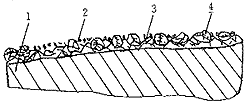
1. Knife 2. Chip 3. Bond 4. Diamond particles
figure 1 2 Internal plating principle and reaming mechanism of diamond reamer
The reamer manufactured by the internal plating method is completely covered by the high-precision inner hole tire mold, and the surface of the coated abrasive grain can achieve high geometric precision, the abrasive grain has good contour and sharp edge, so the cutting performance is excellent. In the external plating reamer, the surface roughness of the processed hole is small, and the tool does not need to be ground, and the service life is long.
During the reaming of the diamond reamer, the reamer abrasive particles interfere with the wall of the workpiece and interact with each other, and the interference points are continuously cut off to perform mutual trimming. The surface of the reamer and the surface of the hole continuously generate new interference points, so that the contact area between the wall of the hole and the surface of the reamer is continuously increased, especially the sharp edge and the sharp angle of the top of the abrasive grain of the reamer correction portion are ground into small ones. Plane, as shown in Figure 1. At the same time, the cutting allowance is getting smaller and smaller, and the cutting action is getting weaker. The effect of the reamer on the extrusion and polishing of the hole wall is stronger, which makes the roundness of the hole higher and the surface roughness value becomes smaller and smaller. This is why the longer the diamond reamer is used, the smaller the surface roughness value of the machined hole.
During the process of reaming the inner hole of the workpiece by the diamond reamer, the reamer cutting part cuts off most of the workpiece (in fact, the total reaming margin is small), while the correction part only removes a small amount of allowance, but it is on the surface of the workpiece. Extrusion and polishing are the main processes of reaming the diamond reamer and are the main factors to ensure the quality of the workpiece. At the same time, by extrusion and polishing, the surface of the workpiece is plastically deformed to increase the hardness. According to the experimental measurement, the hardness of the surface of the workpiece after reaming with a diamond reamer is significantly increased by 0.5 to 1.0 times than that before reaming, which is undoubtedly beneficial for improving the service life of the workpiece. 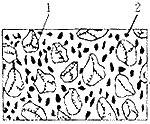
1. Diamond 2. Chip
figure 2 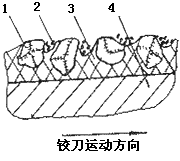
1. Diamond particles 2. Chips 3. Binder 4. Knife body
image 3 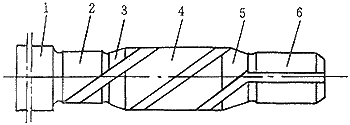
1. Clamping portion 2. Rear guide portion 3. Reverse taper portion 4. Correcting portion 5. Cutting portion 6. Leading portion
Figure 4 3 Structural design of the inner containing diamond reamer
Generally, the length of the correction portion is selected from 2 to 3 times the processing aperture. A small value is taken when the hole length is long, and a large value is taken when the hole is short. The radial dimension of the correction section depends on the specific conditions such as the surface roughness of the workpiece, the shape of the hole, the precision of the preformed hole, and the amount of reaming. 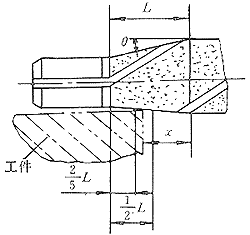
L——cut length, x——actual cutting length, q——cutting cone angle
Figure 5 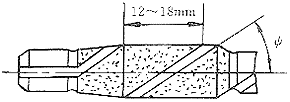
Image 6
The length and the taper angle of the cutting portion are mainly determined according to the amount of cutting allowance. Generally, the length is 15 to 25 mm; when the cutting cone angle is coarse, q = 0° 3' to 0° 15', and q is used for fine hinge. =0°1'~0°5' to ensure that the reamer enters the actual cutting state at 2/5 to 1/2 (Fig. 5). The formula for calculating the cone angle is
L——cut length, mm
K——length coefficient, take 2/5~1/2
The taper angle tolerance is 3 to 4 levels.
The spiral groove is generally designed with 2 to 5 spirals, the helix angle is 20=20°~45°, and the spiral direction is left-handed to advance the chips and coolant to the unreamed surface to ensure that the hinged surface is protected from scratches. At the same time, the choice of spiral groove and helix angle should ensure the proper cutting width of the reamer, generally 12~18mm (Figure 6). 4 Diamond reamer internal plating manufacturing process
In the electroplating process, by electrolysis, the bright nickel plating method is used to reduce the internal stress of the coating by manufacturing the additive content, and at the same time, the plating layer is flat. The more reasonable plating process specifications are shown in the following table: name Content (g/L) Nickel sulfate (NiSO4-7H2O) 250 to 300 Sodium chloride (NaCl) 10-20 Boric acid (H3BO3) 35~40 Saccharin (6H5COSO2NH2) 1 to 2 Coumarin (C9H6O2) 0.5 to 1 Sodium lauryl sulfate (C12H25SO4Na) 0.1 to 0.2 PH value 4.0 to 4.5 Temperature (°C) 40~45 Current density (A/dm2) 1.5 to 3
The body material is generally 45 steel, quenched to a hardness of 40 ~ 45HRC, and is refined.
When cutting and grooving, it is necessary to ensure that the dimensional accuracy of the reamer is not affected. When the blade is opened, the corundum metal can be polished by a corundum grinding wheel, and the two metals with different chemical solubility can be electroplated and then subjected to corrosion treatment. Electrochemical corrosion and mechanical processing can be used for slotting. 5 Conclusion
Design and manufacture of inner plating diamond reamer
Abstract 1 Introduction Diamond reamer is a high-precision bore machining tool developed in the past 20 years. Due to its high processing precision (generally up to 2μm), the surface roughness value is small (generally up to Ra 0.4 ~ 0.2μm), processing efficiency...